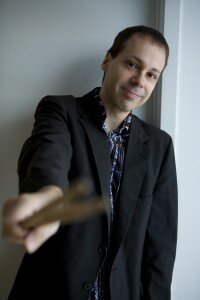Interview- To dance or not? Composer Lukas Ligeti assaults body and mind
 International composer Lukas Ligeti emphasizes movement in his experimental electronic scores.
International composer Lukas Ligeti emphasizes movement in his experimental electronic scores.PUBLICITY PHOTO BY CHRIS WOLTMANN
As the son of composer Gyorgy Ligeti (whose pieces have been featured in Stanley Kubrick's The Shining, 2001: A Space Odyssey, and Eyes Wide Shut) and as the mastermind behind the West-African techno-folk pop ensemble, Burkina Electric, Austrian composer Lukas Ligeti may have some big shoes to fill. But as an innovator in experimenting with electronic percussion, he has a refreshingly straightforward approach to music. According to Ligeti, pushing sound to its kinetic limits can explore the union between abstract questions and cultural influences.
"My interest is in trying to find new sounds, relationships, how musicians interact in an ensemble, how to combine different speeds, rhythms," he says. "I'm not interested in conveying concrete meaning or making people dance."
The vibrant beats and complex loops, repetitions, and rhythms of his third album, Afrikan Machinery, draw from Ligeti's long history with the African continent and combine references to architecture and math. Don't let the intellectual babble overwhelm you though; while thoughtful, Ligeti draws influence primarily from the union of sound and movement. Unlike other experimental electronic percussionists, who will sit on their laptops and lifelessly tap out beats, Ligeti retains traditional percussion instruments, allowing his performance to be guided by his explosive movements–- assaulting both the ears and the eyes.
The Hook: What inspired this union of electronics, percussion, and traditional African influences?
Lukas Ligeti: I was working with traditional musicians, fascinated with African music, and I wanted to do something completely different. Going to Africa was life-changing–- I've been there twenty times.
The Hook: But you don't go fully electronic by using only computer-aided instruments. Why do you continue to utilize traditional percussion instruments?
LL: I didn't want to lose the kinetic aspect of playing music. When somebody's playing on a laptop, you don't really see them move–- I wanted to move when playing music. It's like dancing.
The Hook: You've said two different things–- you can dance to your music, but you aren't writing dance-able music.
LL: When it comes to the dancing, I come from the African approach, where there's no separate word for music and dancing. I can always dance to my music, I know the logic of my music–- it always depends if you know the secret code to the music, what to listen for. It's possible to dance to any kind of music if you know that code.
The Hook: How does your music serve to transcend culture?
LL: In my case, I'm a rootless person, personally and musically–- I grew up internationally, don't really have a strong sense of geographical or cultural home, so for me a mix of cultures was always a natural state. I hope my work in places like Africa helps fight prejudices and clich©s and contributes to understandings between different cultures, but sometimes I think that's a failure.
The Hook: What are some images that spark your interest?
LL: Math, physics, and architecture, visual art, paintings, politics...
The Hook: With such a unique musical perspective, how do you continue to challenge yourself?
LL: I try to play something, and I can't, I try to write something and can't figure out how to do it. Challenges come on their own–- I don't do anything to find them, but I also don't do anything to keep them away.
Lukas Ligeti plays at The Bridge, Saturday, March 20. The show starts at 8 pm and tickets are free.